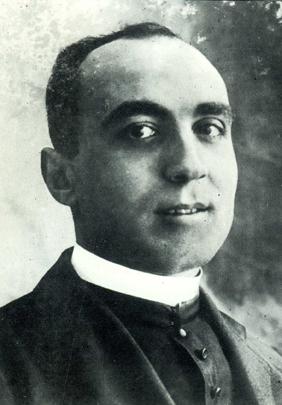English
Llorenç Riber (Campanet, Mallorca, 1881-1958) was a poet, fiction writer, translator and priest.
Along with other writers such as Miquel Ferrà and Maria Antònia Salvà, he belonged to the "Mallorca School" strand of the movement of Noucentisme. Not long after his literary beginnings he was being awarded prizes for his poetic work in the "Jocs Florals" literary competitions of Mallorca and Barcelona. In the Barcelona events, he was declared winner in 1907, 1908 and 1910 and was also proclaimed "Mestre en Gai Saber"(Master in the Art of Poetry). With Miquel Ferrà, he was a driving force behind the review Migjorn (1906-1907), which brought together the main ideas of the Mallorca School. In 1909 he published the prose work Lliris del camp (Lilies of the Field) and, in 1912, A sol ixent (To the Rising Sun), his first collection of poems.
In 1913, he moved to Barcelona, where he resided until the outbreak of the Spanish Civil War in 1936. In the capital of Catalonia, he worked in the library of the Ateneu Barcelonès (Athenaeum of Barcelona) and wrote articles for a range of publications including La Veu de Catalunya, Diario de Barcelona, La Publicitat, El Matí and El sol. Among his prose works are Els sants de Catalunya (The Saints of Catalonia, 1919-1922), Per l'altar i per la llar (Through Altar and Hearth, 1928), the two volumes of Any cristià (Christian Year, 1929-1930) and of particular interest is the work La minyonia d'un infant orat (The Youth of a Wild Child, 1935), where he describes his childhood experiences in considerable detail and précieuse style. The volume Poesies (Poems, 1931) brings together the three collections of Riber: A sol ixent, Les corones (The Crowns, 1917) and A sol alt (High Sun, 1931). Llorenç Riber has also left a valuable legacy of translations of Greek and Latin classics in both Catalan and Spanish.
In 1927 he became a member of the Royal Academy of the Spanish Language. After the Civil War ended, he went to live in Madrid and continued working in the world of culture, now serving the Franco regime. He continued writing articles in the press, in such publications as España, Noticiero de España, Diario de Barcelona and the magazine Destino. In 1955, he was decorated with Spain's highest civil award, the "Gran Cruz de Alfonso el Sabio" (Great Cross of Alfonso the Wise) and, in 1956, because of health problems, he returned to his birthplace where he remained until his death in October 1958.
Web page: Toni Terrades for AELC.
Documentation: Toni Terrades and Prologue by Damià Pons to the book La minyonia d'un infant orat. Barcelona: La Magrana, 2007.
Photographs: © Ajuntament de Campanet.
Translation: Julie Wark.

